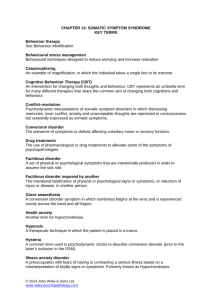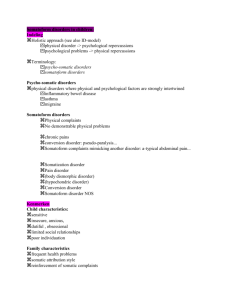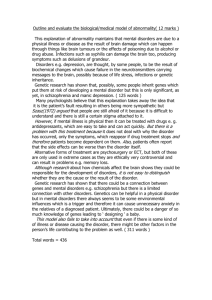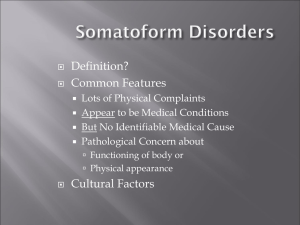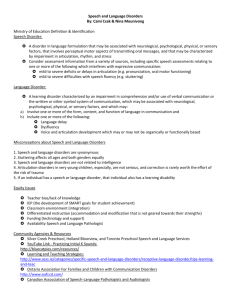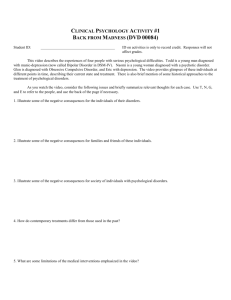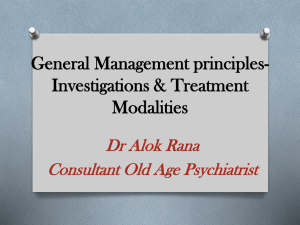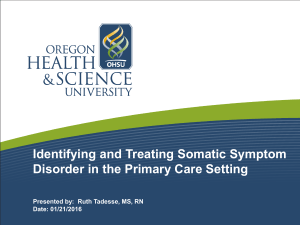Call for Action Second DSM-5 public review
advertisement
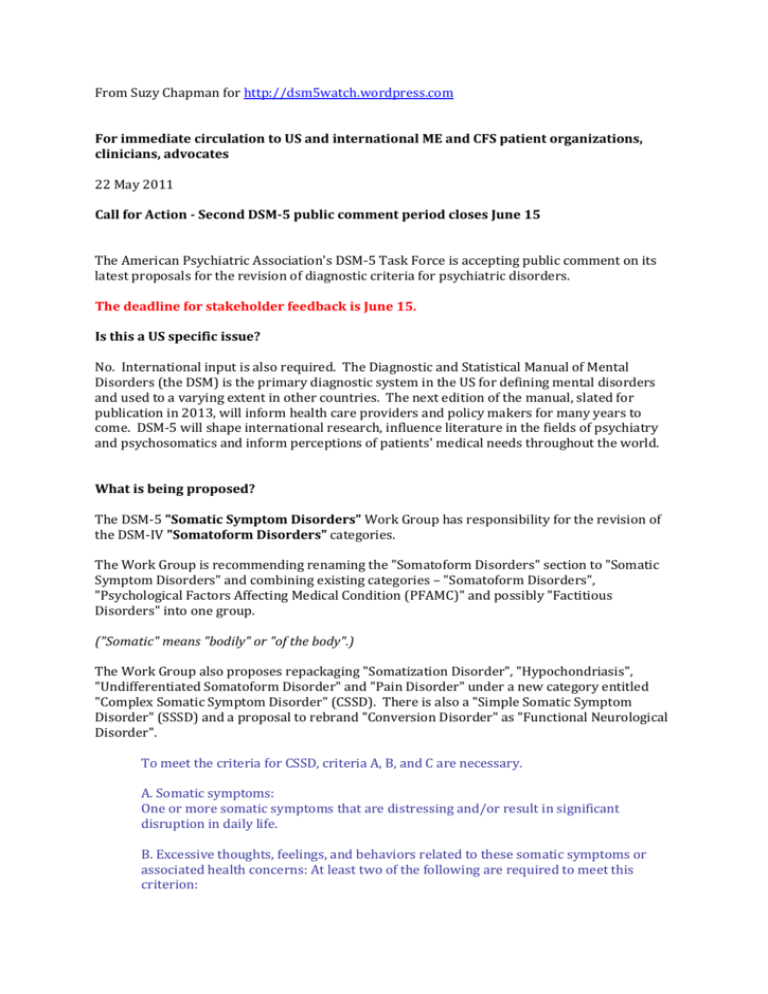
From Suzy Chapman for http://dsm5watch.wordpress.com For immediate circulation to US and international ME and CFS patient organizations, clinicians, advocates 22 May 2011 Call for Action - Second DSM-5 public comment period closes June 15 The American Psychiatric Association's DSM-5 Task Force is accepting public comment on its latest proposals for the revision of diagnostic criteria for psychiatric disorders. The deadline for stakeholder feedback is June 15. Is this a US specific issue? No. International input is also required. The Diagnostic and Statistical Manual of Mental Disorders (the DSM) is the primary diagnostic system in the US for defining mental disorders and used to a varying extent in other countries. The next edition of the manual, slated for publication in 2013, will inform health care providers and policy makers for many years to come. DSM-5 will shape international research, influence literature in the fields of psychiatry and psychosomatics and inform perceptions of patients' medical needs throughout the world. What is being proposed? The DSM-5 "Somatic Symptom Disorders" Work Group has responsibility for the revision of the DSM-IV "Somatoform Disorders" categories. The Work Group is recommending renaming the "Somatoform Disorders" section to "Somatic Symptom Disorders" and combining existing categories – "Somatoform Disorders", "Psychological Factors Affecting Medical Condition (PFAMC)" and possibly "Factitious Disorders" into one group. ("Somatic" means "bodily" or "of the body".) The Work Group also proposes repackaging "Somatization Disorder", "Hypochondriasis", "Undifferentiated Somatoform Disorder" and "Pain Disorder" under a new category entitled "Complex Somatic Symptom Disorder" (CSSD). There is also a "Simple Somatic Symptom Disorder" (SSSD) and a proposal to rebrand "Conversion Disorder" as "Functional Neurological Disorder". To meet the criteria for CSSD, criteria A, B, and C are necessary. A. Somatic symptoms: One or more somatic symptoms that are distressing and/or result in significant disruption in daily life. B. Excessive thoughts, feelings, and behaviors related to these somatic symptoms or associated health concerns: At least two of the following are required to meet this criterion: (1) High level of health-related anxiety. (2) Disproportionate and persistent concerns about the medical seriousness of one’s symptoms. (3) Excessive time and energy devoted to these symptoms or health concerns. C. Chronicity: Although any one symptom may not be continuously present, the state of being symptomatic is chronic (at least 6 months). Where can I find the full criteria for "CSSD", "PFAMC" and other proposed categories? Proposed criteria are set out on the DSM-5 Development site: http://tinyurl.com/Somatic-Symptom-Disorders The CSSD criteria are here: http://tinyurl.com/DSM-5-CSSD There are two key PDF documents here, "Disorders Descriptions" and "Rationale", which expand on the Work Group's proposals: http://tinyurl.com/SSD-Disorders-Description http://tinyurl.com/SSD-Justification-of-Criteria Which patient groups might be hurt by these proposals? The Chronic Fatigue Syndrome Advisory Committee (CFSAC) provides advice and recommendations to the Secretary of Health and Human Services (HHS). On Day One of the May 10-11 CFSAC meeting, CFSAC Committee discussed the implications of these proposals for CFS and ME patients as part of the agenda item around the proposed coding of CFS for ICD-10CM. You can watch this section of the meeting (4hrs 27mins in from start of video) here: http://nih.granicus.com/ViewPublisher.php?view_id=26 If the Work Group's proposals gain DSM Task Force approval, all medical diseases, whether "established general medical conditions or disorders", like diabetes or heart disease, or conditions presenting with "somatic symptoms of unclear etiology" will have the potential for a bolt-on diagnosis of a "somatic symptom disorder" - if the practitioner feels the patient meets the new criteria. As discussed by CFSAC committee members, earlier this month, CFS, ME, Fibromyalgia and IBS patients, already diagnosed or waiting on a diagnosis, may be especially vulnerable to highly subjective criteria and difficult to quantify concepts such as "disproportionate distress and disability", "catastrophising", "health-related anxiety" and "[appraising] bodily symptoms as unduly threatening, harmful, or troublesome." Other patient groups that are also bundled under the so-called "Functional somatic syndromes" and "medically unexplained" umbrellas, like Chemical Injury (CI), Chemical Sensitivity (CS), chronic Lyme disease and GWS, are highly vulnerable. In a 2009 Editorial on the progress of the Work Group, the chair wrote that by doing away with the "controversial concept of medically unexplained", their proposed classification might diminish "the dichotomy, inherent in the 'Somatoform' section of DSM-IV, between disorders based on medically unexplained symptoms and patients with organic disease." The conceptual framework the Work Group proposes: "...will allow a diagnosis of somatic symptom disorder in addition to a general medical condition, whether the latter is a well-recognized organic disease or a functional somatic syndrome such as irritable bowel syndrome or chronic fatigue syndrome." So under the guise of eliminating "medically unexplained" symptoms as a diagnostic criterion in order to diminish "stigma", eradicating "terminology [that] enforces a dualism between psychiatric and medical conditions" and language that is "divisive between patients and clinicians", the APA appears hell bent on colonising the entire medical field by licensing the potential application of a mental health diagnosis to all medical diseases and disorders, if the clinician considers that the patient's response to their bodily symptoms or their perceived level of disability is "disproportionate" or their coping styles, "maladaptive". In its latest proposals, the Work Group writes: "...Having somatic symptoms of unclear etiology is not in itself sufficient to make this diagnosis. Some patients, for instance with irritable bowel syndrome or fibromyalgia would not necessarily qualify for a somatic symptom disorder diagnosis. Conversely, having somatic symptoms of an established disorder (e.g. diabetes) does not exclude these diagnoses if the criteria are otherwise met." "...The symptoms may or may not be associated with a known medical condition. Symptoms may be specific (such as localized pain) or relatively non-specific (e.g. fatigue). The symptoms sometimes represent normal bodily sensations (e.g., orthostatic dizziness), or discomfort that does not generally signify serious disease..." "...Patients with this diagnosis tend to have very high levels of health-related anxiety. They appraise their bodily symptoms as unduly threatening, harmful, or troublesome and often fear the worst about their health. Even when there is evidence to the contrary, they still fear the medical seriousness of their symptoms. Health concerns may assume a central role in the individual's life, becoming a feature of his/her identity and dominating interpersonal relationships." These proposals could result in misdiagnosis of a mental health disorder or the misapplication of an additional diagnosis of a mental health disorder. There may be considerable implications for these highly subjective criteria for the diagnoses assigned to patients, for the provision of social care, the payment of employment, medical and disability insurance, the types of treatment and testing insurers are prepared to fund and the length of time for which insurers are prepared to pay out. Dual-diagnosis may bring thousands more patients, potentially, under a mental health banner where they may be subject to inappropriate treatments, psychiatric services, antidepressants, antipsychotics and behavioural therapies such as CBT, for the "modification of dysfunctional and maladaptive beliefs about symptoms and disease, and behavioral techniques to alter illness and sick role behaviors and promote more effective coping [with their somatic symptoms]." Coding CFS in the "Signs, symptoms and ill-defined conditions" chapter of the forthcoming ICD-10-CM would also render CFS and ME patients more vulnerable to these DSM-5 Work Group recommendations that will provide another dustbin in which to shovel patients with socalled "medically unexplained" bodily symptoms. Who should submit comment on these proposals? All stakeholders are permitted to submit comment and the views of patients, carers, families and advocates are important. But evidence-based submissions from the perspective of informed medical professionals - clinicians, psychiatrists, researchers, allied health professionals, lawyers and other professional end users are likely to have more influence. National and state patient organizations also need to submit comment. To date, not one patient organization in the US or UK has confirmed to me that they intend to submit feedback, this year. So we need to lean heavily on our patient organizations to review these criteria. Where can I read last year's submissions? Copies of international patient organization submissions for the first DSM-5 public and stakeholder review are collated on this page of my site, together with selected patient and advocate submissions: DSM-5 Submissions to the 2010 review: http://tinyurl.com/DSM5submissions How to comment: Register to submit feedback via the DSM-5 Development website: http://tinyurl.com/SomaticSymptom-Disorders More information on registration and preparing submissions here: http://tinyurl.com/DSM-5register-to-comment What else can I do? Use mailing lists, forums, blogs, websites and contacts to get this information out - especially platforms where clinicians, allied health professionals, medical lawyers and patient organization reps participate. Alert state and national ME, CFS, FM and IBS patient organizations to the deadline and lobby for their involvement. This is the last alert I shall be sending out. Remember, the deadline is June 15. Thank you. ----------------Text and formatted versions of this document in Word .doc and PDF format will be available on my website. Suzy Chapman _____________________ me.agenda@virgin.net http://dsm5watch.wordpress.com
